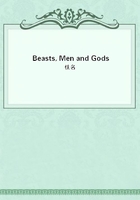
第21章 THE BATTLE ON THE SEYBI(3)
At last we reached the middle of the river, where the current became exceedingly rapid and began to carry us down with it. Out of the ominous darkness I heard the shoutings of my companions and the dull cries of fear and suffering from the horses. I was chest deep in the icy water. Sometimes the floating blocks struck me;sometimes the waves broke up over my head and face. I had no time to look about or to feel the cold. The animal wish to live took possession of me; I became filled with the thought that, if my horse's strength failed in his struggle with the stream, I must perish. All my attention was turned to his efforts and to his quivering fear. Suddenly he groaned loudly and I noticed he was sinking. The water evidently was over his nostrils, because the intervals of his frightened snorts through the nostrils became longer. A big block of ice struck his head and turned him so that he was swimming right downstream. With difficulty I reined him around toward the shore but felt now that his force was gone. His head several times disappeared under the swirling surface. I had no choice. I slipped from the saddle and, holding this by my left hand, swam with my right beside my mount, encouraging him with my shouts. For a time he floated with lips apart and his teeth set firm. In his widely opened eyes was indescribable fear. As soon as I was out of the saddle, he had at once risen in the water and swam more calmly and rapidly. At last under the hoofs of my exhausted animal I heard the stones. One after another my companions came up on the shore. The well-trained horses had brought all their burdens over. Much farther down our colonist landed with the supplies. Without a moment's loss we packed our things on the horses and continued our journey. The wind was growing stronger and colder. At the dawn of day the cold was intense. Our soaked clothes froze and became hard as leather; our teeth chattered; and in our eyes showed the red fires of fever: but we traveled on to put as much space as we could between ourselves and the Partisans. Passing about fifteen kilometres through the forest we emerged into an open valley, from which we could see the opposite bank of the Yenisei. It was about eight o'clock. Along the road on the other shore wound the black serpent-like line of riders and wagons which we made out to be a column of Red soldiers with their transport. We dismounted and hid in the bushes in order to avoid attracting their attention.
All the day with the thermometer at zero and below we continued our journey, only at night reaching the mountains covered with larch forests, where we made big fires, dried our clothes and warmed ourselves thoroughly. The hungry horses did not leave the fires but stood right behind us with drooped heads and slept. Very early in the morning several Soyots came to our camp.
"Ulan? (Red?)" asked one of them.
"No! No!" exclaimed all our company.
"Tzagan? (White?)" followed the new question.
"Yes, yes," said the Tartar, "all are Whites.""Mende! Mende!" they grunted and, after starting their cups of tea, began to relate very interesting and important news. It appeared that the Red Partisans, moving from the mountains Tannu Ola, occupied with their outposts all the border of Mongolia to stop and seize the peasants and Soyots driving out their cattle.
To pass the Tannu Ola now would be impossible. I saw only one way--to turn sharp to the southeast, pass the swampy valley of the Buret Hei and reach the south shore of Lake Kosogol, which is already in the territory of Mongolia proper. It was very unpleasant news. To the first Mongol post in Samgaltai was not more than sixty miles from our camp, while to Kosogol by the shortest line not less than two hundred seventy-five. The horses my friend and I were riding, after having traveled more than six hundred miles over hard roads and without proper food or rest, could scarcely make such an additional distance. But, reflecting upon the situation and studying my new fellow travelers, Idetermined not to attempt to pass the Tannu Ola. They were nervous, morally weary men, badly dressed and armed and most of them were without weapons. I knew that during a fight there is no danger so great as that of disarmed men. They are easily caught by panic, lose their heads and infect all the others. Therefore, Iconsulted with my friends and decided to go to Kosogol. Our company agreed to follow us. After luncheon, consisting of soup with big lumps of meat, dry bread and tea, we moved out. About two o'clock the mountains began to rise up before us. They were the northeast outspurs of the Tannu Ola, behind which lay the Valley of Buret Hei.